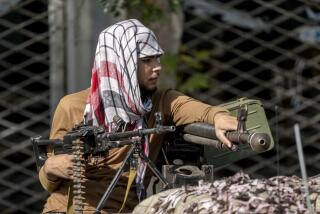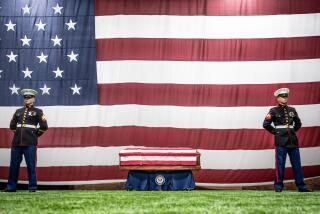A search for work again ends tragically in Baghdad
- Share via
BAGHDAD — The three friends forged a pact. Thursday at the crack of dawn, the unemployed young men would go together to the police recruiting station in central Baghdad and try to sign up to be law enforcement officers.
They huddled together at a nearby circle waiting for the center to open at 6:30 a.m. Neither noticed the man who approached wearing an explosives-packed belt. The blast shook their world.
Only one of them, 25-year-old Mustafa Numan, survived.
“We were all getting ready to get into line when the explosion occurred,” he said from his bed at Kindi Hospital, where he was treated for stomach and leg wounds in an attack that killed 14 Iraqis and injured 25.
“I lost consciousness and came to at the hospital,” he said, complaining that the facility was dirty and ill-equipped. “I consider myself lucky when I think about those who lost their lives.”
Despite the blast, Numan and other victims said they probably would return to the recruiting station. Yousef Haroun, 24, said he would sign up for the police academy once he recovered.
“This is the only potential source of steady income for me, and my options are limited,” he said.
The explosion apparently was the latest strike by Sunni Arab insurgents against the Shiite Muslim-dominated government.
Also Thursday, three U.S. troops were reported killed in separate combat incidents.
Sunnis consider Iraq’s security forces a Shiite-controlled tool in the country’s civil war. In addition to the recruiting center bombing, insurgents killed a police intelligence officer in west Baghdad on Thursday and attempted to kill a police commander near Kirkuk, in the north. Bombings and shootings left at least three people dead in the capital.
Suspected Shiite militiamen believed to have ties to security forces have waged their own deadly campaign, killing dozens of people a day in secretive death squad operations. At least 36 bodies were discovered in and around Baghdad on Thursday. Four were found in southern Iraq.
Assailants in west Baghdad shot to death a teacher as she and her students at a girls high school were leaving for the day.
The three U.S. troops died over the last three days. A Marine was slain Thursday in Al Anbar province. A soldier was killed in a roadside bombing south of Baghdad on Wednesday. Another soldier died Tuesday in Al Anbar.
December is shaping up as one of the deadliest months for Americans in Iraq.
U.S. troops told visiting Defense Secretary Robert M. Gates that a controversial proposal to increase the American military presence in Baghdad would buy time to stabilize the country.
“I really think we need more troops here,” Army Spc. Jason Glenn told Gates at Camp Victory in Baghdad, in an exchange broadcast on CNN. “With more presence on the ground, more troops might hold them [the insurgents] off long enough to where we can get the Iraqi army trained up.”
Gates, in Iraq on a second day of a fact-finding mission, was told by the soldier that the current strategy of training Iraqi forces to take over was working.
“Sir, I think we need to just keep doing what we’re doing,” Glenn said.
Gates later met with senior Iraqi officials, assuring them of U.S. support for the fractured Baghdad government.
“The Iraqi government is determined to improve the security of the people here in Iraq, and above all here in Baghdad,” he said after meeting with Prime Minister Nouri Maliki and other officials.
Iraqi lawmakers seeking the approval of the nation’s most powerful Shiite cleric to form a new political coalition that would sideline extremists were put off for a few days.
The cleric, Grand Ayatollah Ali Sistani, “supports any action that unites political efforts and unifies Iraq and Iraqis,” Falah Fyadh, a Shiite member of parliament, said after a 90-minute talk with the cleric.
Meanwhile, the judge in the genocide trial of Saddam Hussein and six codefendants silenced testimony suggesting that Turkey, a U.S. ally, cooperated with Baghdad during the late 1980s in an operation that used chemical weapons to crush rebellious Kurds.
“There has to be very delicate cooperation with the Turkish side to ensure that these ... “ said a passage in an Aug. 21, 1988, document read in the courtroom before the judge cut off the sound.
Another audio snippet a few minutes later referred to a “secret Iraqi-Turkish protocol” that allowed Turkish troops to enter Iraq in pursuit of Kurdish guerrillas fighting the government in Ankara.
*
Special correspondents in Baghdad, Hillah and Kirkuk contributed to this report.
More to Read
Sign up for Essential California
The most important California stories and recommendations in your inbox every morning.
You may occasionally receive promotional content from the Los Angeles Times.










